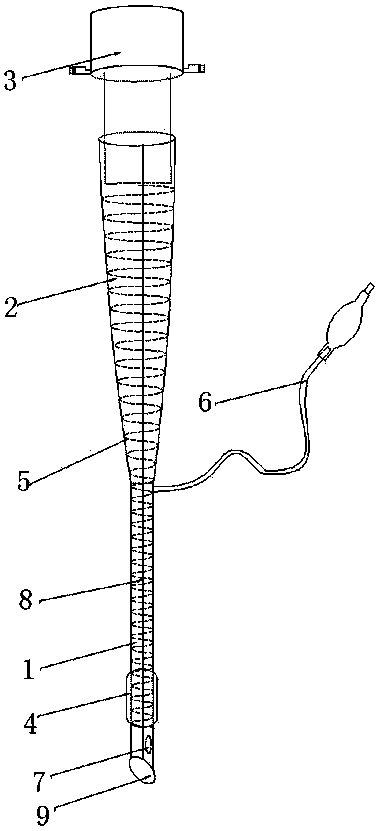Lengthened fracturing resistant and pressing resistant type trachea cannula with expansion end
A technology of endotracheal intubation and enlarged end, which is applied in the field of anti-bending endotracheal intubation with extended end and expanded end, which can solve the problems that the breathing tube connection environment is not loose, affects the patient's breathing management, and makes breathing management difficult, so as to facilitate smooth passage , facilitate market promotion, and improve the effect of safety
- Summary
- Abstract
- Description
- Claims
- Application Information
AI Technical Summary
Problems solved by technology
Method used
Image
Examples
Embodiment 1
[0026] The main structure of this embodiment, such as figure 1 As shown, an extended endotracheal intubation tube with an enlarged end and an anti-bending type includes an endotracheal intubation body. One end of the endotracheal intubation body is the front end 1 of the intubation tube. shape, the diameter of the other end gradually increases to form an enlarged end 2, which is screwed together with the intubation joint 3, the front end 1 of the intubation is provided with an anti-leakage device 4, and one side of the tube wall of the endotracheal intubation body is connected with an anti-leakage device. The inflatable tube 6 connected with the leakage device 4 is provided with a small hole 7 between the leakage prevention device 4 and the opening 9, and a metal wire 5 is embedded in the lumen of the endotracheal tube body. In the present invention, the anti-leakage device 4 is provided at the front end of the intubation tube. The anti-leakage device 4 is a thin-walled cuff,...
Embodiment 2
[0028] In this embodiment, on the basis of Example 1, the length of the endotracheal tube body is further limited to 24-36 cm. The length of the existing endotracheal tube apart from the incisors (teeth) is only about 8 cm. If the length is increased by 4cm, the total length of the endotracheal tube will reach 24-36cm, effectively increasing the length of the endotracheal tube located outside the incisors, and ensuring the looseness of the connection environment between the endotracheal tube and the patient's breathing circuit when the patient is under general anesthesia in the prone position . Other parts of this embodiment are the same as those of Embodiment 1, and will not be repeated here.
Embodiment 3
[0030]In this embodiment, on the basis of the above-mentioned embodiments, it is further defined that the initial position of the enlarged end 2 matches the inner diameter of the front end 1 of the cannula, and the inner diameter of the enlarged end 2 gradually increases to 7.5 mm from the initial end to the end. For tracheal intubation in children, the inner diameter and depth of the front end 1 of the intubation should match the age of the child, and the insertion depth of the tracheal intubation body should reach the middle of the trachea of the child. The relationship between the inner diameter of the front end of the intubation tube and the age of the child is: the inner diameter of the front end of the endotracheal tube body ID (mm) = 2.5 + 0.4 × age, and the relationship between the depth of the intubation tube and the age of the child is: the insertion depth of the endotracheal tube body L = 12 +Age / 2, the part other than the depth of endotracheal intubation, that is,...
PUM
 Login to View More
Login to View More Abstract
Description
Claims
Application Information
 Login to View More
Login to View More - R&D
- Intellectual Property
- Life Sciences
- Materials
- Tech Scout
- Unparalleled Data Quality
- Higher Quality Content
- 60% Fewer Hallucinations
Browse by: Latest US Patents, China's latest patents, Technical Efficacy Thesaurus, Application Domain, Technology Topic, Popular Technical Reports.
© 2025 PatSnap. All rights reserved.Legal|Privacy policy|Modern Slavery Act Transparency Statement|Sitemap|About US| Contact US: help@patsnap.com

